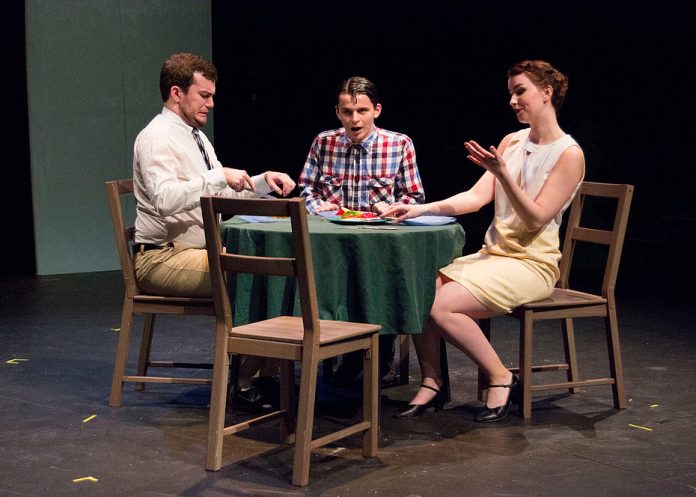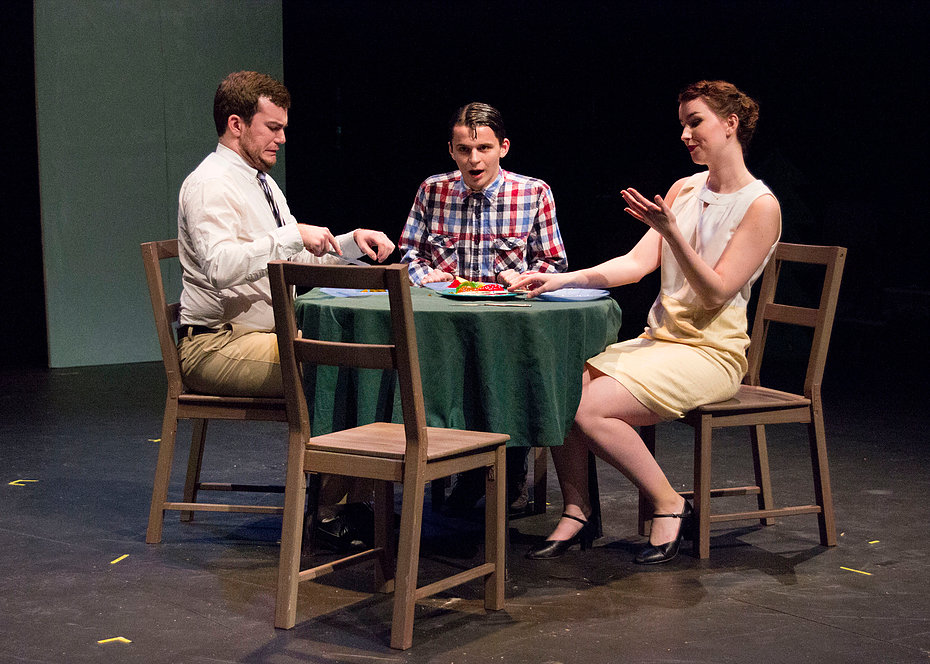What if you could experience theatre in a kind of loop: walking out of one show and into another, travelling through a new world each hour, dozens of emotions surging through you as you saunter through this liminal space between theater and life, each competing for legitimacy in a mental game of tug-of-war? Twice a year, when the time is just right, this very loop opens up in the Studio Theatre, commonly known as the Black Box, inviting students, family members and any other theatre-adventurers to experience its wonders. This experience occurs only during Studio Productions weekend.
From March 17-19, the Black Box transforms into a theatre-telling machine, this year showcasing five different shows for the audience’s perusal: Reverse Transcriptions: Six Playwrights Bury a Seventh by Tony Kushner (directed by Simone Becker ’18), The American Century by Murphy Guyer (directed by Evan Richter ’17), WASP by Steve Martin (directed by Drew Maidment ’18), The Other Room by Ariadne Blayde (directed by Irene Martinko ’18) and Final Placement by Ara Watson (directed by Eve Engel ’17). Each unique story was told in less than an hour, packaging two or three Studios into the average amount of time for one full-length mainstage production. According to Studios Coordinator Avary Don ’17, it is this sense of convenience and accessibility that gives Studio Productions their unique flair.
“People should support Studios because they allow for more diverse productions than the standard mainstage, and create performance and design opportunities for students [who] wouldn’t otherwise be able to create theatre,” Don said. “What makes Studios different is that they’re entirely student-produced shows. That means the actors, directors, stage managers, dramaturges, and designers are all students, as well as the carpenters and electricians building the shows. They’re really an incredible — and my favorite — part of Muhlenberg theatre.”
The fact that Studios are student-driven seems to be a kind of motif throughout the commentary surrounding them. Audience member Kylee Jacoby ’20 notes that this is what makes them so integral to the fabric of the Muhlenberg theatre community.
“[Studios] give students full creative control, so [they give] the actors more responsibility, which is important. They can’t fall back on the faculty genius,” said Jacoby. “It’s awesome that students can direct Mainstages and they have an artistic director, but it’s also nice that they have another opportunity to have full control. The costume design and the set design and the sound design, to be student run — it’s really good in an educational sense for a college to have that opportunity.”
Still, this sense of duty affects more than the directors. Students like Belle Goodman ’20, who played the Woman in the three-character comedy The American Century, share the weight of running a Studio show from their point of view on the stage.
“I mean, anytime you get to put on a show run entirely by students, it’s the best thing ever,” Goodman said. “However, getting the added elements of a full set and lighting and a proper theatre makes it feel a little more grown up, but it’s also a bit scarier because it feels like there are even more people counting on you! It’s really interesting to be able to experience both.”
Though the rehearsal process from Goodman’s point of view was relatively straightforward, involving intuitive blocking, universe-building and focused work on “figuring out why the show progressed in the way that it did, and making sure that every single action was motivated,” Don’s part as coordinator only gained steam as the weekend approached ever-nearer.
“My role in Studios is to organize and coordinate every aspect of the festival from director applications to the final performances,” said Don. “The weeks leading up to Studios are very busy. I’m building tech and performance schedules while working with the master electricians and master carpenters, making sure everyone is prepared for tech week to start. I’m also attending rehearsals and meetings with the theatre department, trying to keep everyone happy and feeling supported.”
Through all of the trials and tribulations, for Don, the rewards far outweigh the costs.
“The best part of Studios was being able to create thought provoking theatre with friends,” Don said. “Studios were my first introduction to theatre at Muhlenberg as a freshman and I’m so happy and grateful to have been able to work on them one last time … It’s difficult with five shows, but looking back it was definitely worth it.”
With a weekend full of theatrical magic to reflect upon, Don, Goodman, and their fellow Studio Productions collaborators should be proud of their work. Each show brought something completely individual to the stage, the Black Box theater giving every production a deeply personal feel and inviting the audience to directly connect with each character on the stage. The sets, ranging from 1940’s-era kitchens to foreign graveyards to a modern classroom, created portals in which the audience was truly trans- ported within them when combined with intriguing lighting and sound choices. Some shows had me holding my friends’ hands in anticipation, some had me elbowing them furiously at innuendos; some provoked the audience to raucous laughter and some to sighs of despair.
The experience of walking directly from one show to another — not to mention the fact that all of the performances were free, a fact that enabled theatre-goers to stay and watch as many shows in a row as their time afforded them — creates a kind of vacuum in which audiences are trapped, reeling from their last journey whilst packing up for the next one, simultaneously analyzing and predicting in the box office lobby. Goodman has a message about the uniquely uniting factor of the productions:
“If you think you are even a little interested in costuming, scenic design, acting, directing, anything really, apply/audition to be a part of Studios!” said Goodman. “They’re one of the best ways to flex your theatrical muscles in a supportive, peer-run environment.”
This is what makes Studios so special: they have a way of linking their audiences on a wild ride from thought to thought, from universe to universe, all within that same small space of the Black Box Theatre.
Brooke is a senior double majoring in English and Media & Communication. She's passionate about french toast, Kate Bishop, Steven Universe and the ocean coasts of Ireland. On campus, she is a Writing Tutor, Orientation Leader and member of the Girls Next Door, Muhlenberg's all-lady a capella group. She could not be more excited to serve as your Editor-In-Chief this year!























